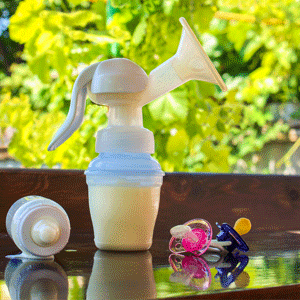
Breastfeeding has a number of benefits to a mother and baby, according to Pei Ching Chuah, the Programme Coordinator for Health and Information at World Alliance for Breastfeeding Action.
“Breast milk is so much more than a food. It is a live tissue with many immune factors that give a baby continuous, active protection against infections when the baby’s body cannot yet protect itself.
Read: Breastfeeding and work - how to make it work
"For the first few days after birth, a mother provides the ideal immunisation for her baby with colostrum, milky fluid, which is rich in antibodies. The amount of colostrum is small, but it is exactly what a baby needs at this time."
Breastfed children are much healthier.
"Breast milk contains just the right amount of energy, protein, vitamins, water and other nutrients for a baby for the first six months of life. When they are older, breastfed babies are less likely to be overweight," she said.
Read: Your complete guide to breastfeeding
Chuah added that breastfed newborn babies have fewer digestive problems, are rarely sick or hospitalised, less likely to suffer from wheezing and bronchitis.
Breastfed babies are also less likely to develop ear infections and suffer from allergies.
"As long as mothers breastfeed, their breast milk will continue to provide their child with antibodies and other protective substances that make illnesses less acute and easier to handle,” said Chuah.
Breastfeeding benefits to mum
Beginning exclusive breastfeeding immediately after birth lowers the mother’s risk for excess post-partum bleeding and anaemia.
“Once mother and baby have learned to do it easily, breastfeeding can reduce a mother’s stress as well by keeping her infant or young child healthy and well nourished."
She said that exclusive breastfeeding can boost a mother’s own immune system, help delay a new pregnancy and reduce the insulin needs of diabetic mothers.
"In the long-term, breastfeeding can help protect a mother from breast and ovarian cancers and brittle bones."
Diet for breastfeeding mums
Chuah said a healthy diet is one that is varied, balanced and natural. A breastfeeding mum should have a diet with an assortment of different groups of foods.
“There is no need to exclude any particular type of food. Instead, the key is to be balanced. Include a bit of everything, within healthy proportions.”
She added that natural foods enhance the impact of a healthy diet on breastfeeding.
The main groups of foods that should be included in a breastfeeding mother’s diet include plenty of fluids, fresh vegetables and fruits, different grains, protein foods from animal sources and/or plant sources and small quantities of fats (preferably uncooked and cold-pressed vegetable oils).
“If you have a family medical history of allergy, it is worth being careful about your diet," said Chuah.
Mothers should also avoid known allergens during pregnancy and breastfeeding.
"If you notice that your baby reacts badly after you have eaten something, it may be best to leave that food out of your diet for a while."
Medication while breastfeeding
Chuah said the vast majority of prescription and over-the-counter medications are compatible with breastfeeding.
However, she pointed out that it is advisable to confirm with a health care professional what medication can and cannot be taken.
“The amount of a drug found in a mother’s milk is usually no more than one to two percent of the maternal dosage taken."
Chuah said choosing a prescribed or over-the-counter drug for a mother is not as simple as it may seem because individuals react differently to the same drug.
"What works well for one mother might not work well for another."
She added that when prescribing or recommending a drug, a licensed medical professional needs to take into account how it will react with the mother’s diet or any other medication the mother is taking.
Weight loss after a baby is born
One of the most common concerns mothers express about pregnancy is losing those extra kilogrammes after the birth of a baby.
"For some women, breastfeeding makes it easier to lose weight, since additional calories are burnt," said Chuah.
"Mothers who do not breastfeed will need to rely only on diet and exercise to burn additional calories."
Breastfeeding mothers tend to lose more weight when their babies are three to six months old, said Chuah.
Read more:




 Publications
Publications
 Partners
Partners










